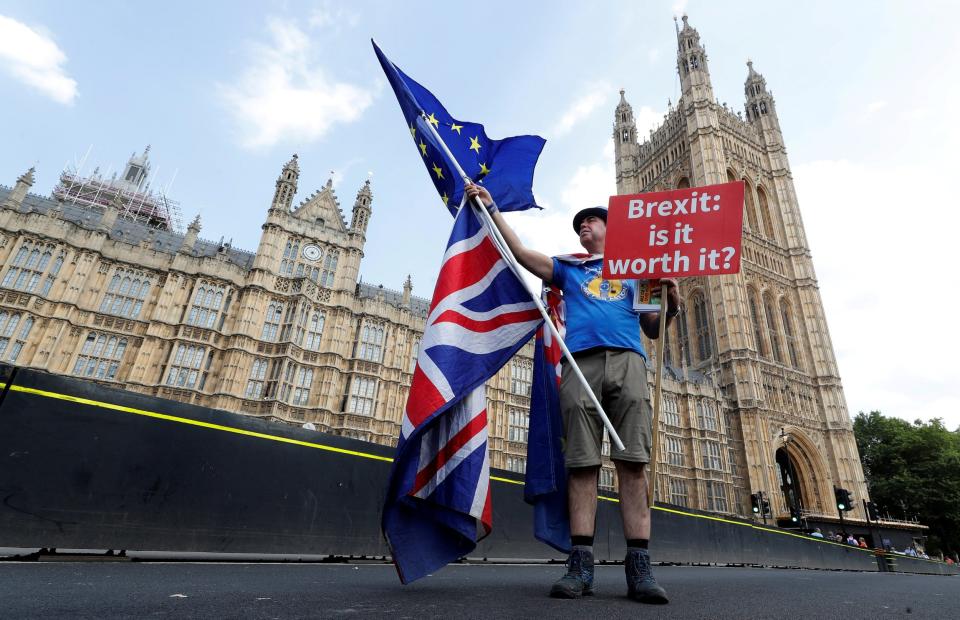Public backing for Final Say referendum leaps amid division over May's Brexit plans
Public backing for a new referendum on Theresa May’s Brexit deal has leapt in the last month, amid deep division over her approach to EU withdrawal.
An exclusive poll for The Independent saw support for a fresh public vote on any deal jump by four points in as many weeks.
The survey by BMG Research also saw increasing support for replacing Ms May if her cabinet cannot agree a deal, and an even bigger majority believing an immediate general election would then be needed.
The survey comes amid dwindling public support for Ms May’s Chequers deal plan for Brexit, not to mention growing discontent in her own party, with some insiders suggesting a leadership challenge is becoming likely this year.
The Independent launched its campaign to win a Final Say Brexit referendum for the British people just three weeks ago – with more than 610,000 people signing our petition so far.
Late last month pollsters asked some 1,500 respondents: “Should a Brexit deal be reached between Britain and the EU, to what extent would you support or oppose a referendum being held asking the public whether they accept or reject the terms of the deal?”
At the time, 44 per cent backed the idea, with 27 per cent opposing, 15 per cent not having strong opinions either way and 14 per cent saying they did not know.
But four weeks later, amid increasing public divisions over Ms May’s Brexit plans, from both inside and outside the Conservatives, 48 per cent now want another referendum.
Opposition has also dropped by three points, with only 24 per cent now against a new public vote on Brexit, 16 per cent not having strong feelings either way and 11 per cent saying they did not know.
Last week a different YouGov poll for the People’s Vote campaign, also pushing for a new referendum, found 50 per cent of people want a new referendum if no deal can be reached with Brussels.
The Independent’s BMG survey found that feeling has also hardened against the prime minister personally since July, at which point 46 per cent of people said she should be replaced if she cannot find a deal her cabinet agrees to, increasing to 49 per cent this month.
In July more than half of people, 51 per cent, believed a new election would be needed if Ms May was ditched as Tory leader, with slightly more, 52 per cent, saying the same this month.
While Ms May appears to have reached a temporary truce with her own ministers through her Chequers deal – which would see the UK stay in a single market for goods, but not services, and implement a complex customs arrangement – deep reservations still exist over the plan.
Boris Johnson and David Davis have already quit over the proposal, but Commons leader Andrea Leadsom has said she will be watching closely to see if the UK is forced to give more ground in negotiations, while international development secretary Penny Mordaunt is also believed to have concerns.
The poll found just 14 per cent of people would back the Chequers plan in a referendum, while 27 per cent said they believed the UK should leave with no deal, and 43 per cent would back remaining inside the bloc.
The survey also showed that just 34 per cent of people think the 2016 vote gave Ms May a mandate to leave the EU without a deal, while 36 per cent said it did not and 31 per cent said they do not know.
Conservative MPs have reported broad discontent in local associations with Ms May’s Chequers plan, adding that it will become completely unacceptable if further compromises are made.
Boris Johnson has been touted by supporters as a potential replacement leader, following his resignation from the frontbench over the plan.
The Independent’s poll found that of all potential Tory successors to Ms May, Mr Johnson attracted most support from the general public, some 15 per cent.
That was more than double the support of his two closest competitors, Jacob Rees-Mogg and Ruth Davidson, who both attracted just six per cent. Chancellor Philip Hammond had five per cent support.
Generally, on voting intention, the two major parties were pretty much tied, with the Conservatives on 37 per cent and Labour on 39 per cent once ‘don’t knows’ were excluded.
BMG Research interviewed 1,481 adults online between 6 and 10 August. BMG are members of the British Polling Council and abide by their rules.


